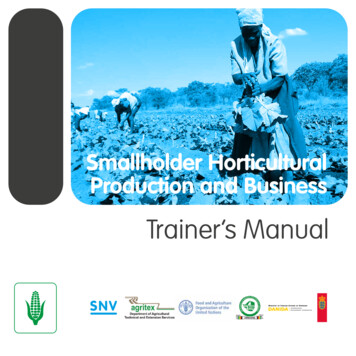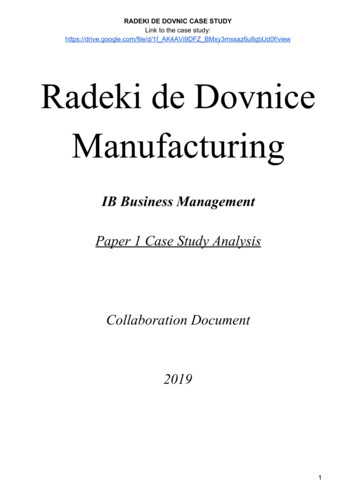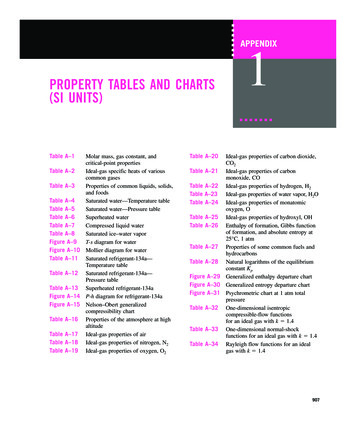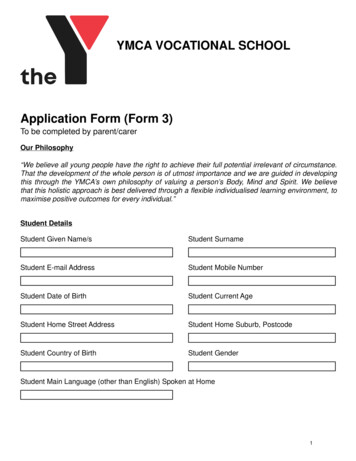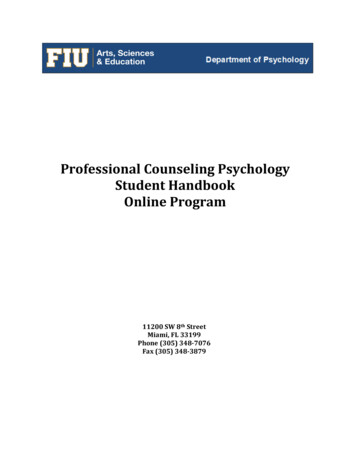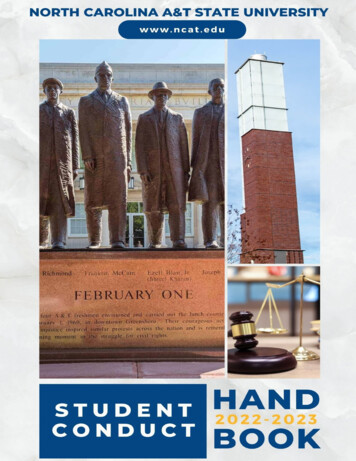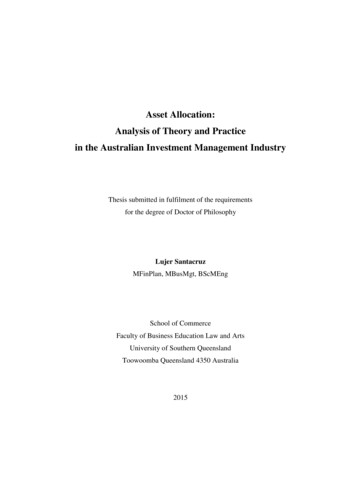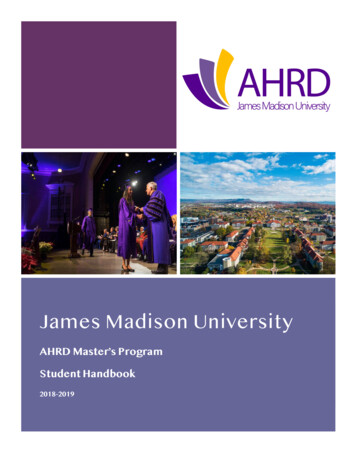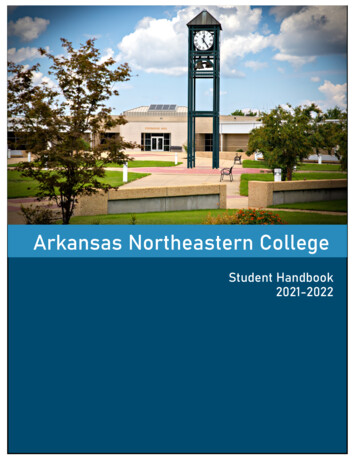
Transcription
TABLE OF CONTENTSStudent Handbook2021-2022 The Department vs. The ProgramPage 2 Mission Statement and Program OverviewPage 3 Contact PeoplePage 4 Sources of Funding Outside the ProgramPage 5 Timeline for Ph.D. StudentsPage 6 Ph.D. Degree RequirementsPage 8 Master’s Plans and RequirementsPage 11 General InformationPage 14Appendices Annual Progress ReportCore Requirements DocumentPage 19Page 23o Revised December 2021o Information complied by the Graduate Program Administrators
What is the difference between the Department of Ecology,Evolution, & Natural Resources and The Graduate Programin Ecology & Evolution?The Department of Ecology, Evolution, & Natural Resources (hereafter, "theDepartment") was founded in its current form in 1997. It superseded a previous departmentof Natural Resources, which had a long and successful history focused on undergraduateeducation and research. The Department is primarily responsible for matters relating toundergraduate education in Ecology and Evolution, Environmental Geomatics, andEnvironmental Planning curricula. It also provides a physical home for some (but by nomeans all) of the faculty and students associated with the Graduate Program in Ecology &Evolution (hereafter, the "Graduate Program"). Most faculty in the Department belong to theGraduate Program, but many members of the Graduate Program hail from other departments.Although it was envisioned that the Department would provide administrative and financialsupport for the Graduate Program, it currently does this to a rather limited extent. There are afew TA and GA lines administered by the Department that typically support students in theGraduate Program. However, most TA support still originates from outside of theDepartment, principally from TAs within the Division of Life Sciences, School of Arts andSciences. The Department does not admit graduate students, or confer graduate degrees. Thechair of the Department is typically not the director of the Graduate Program.The Graduate Program (hereafter, “the Program”) was founded in the mid 1970s bythe well-known ecologists Murray Buell and Paul Pearson. The Program is amultidisciplinary umbrella group consisting of 85 faculty in many different departments,drawn from three Rutgers Campuses and other locations including the Cary Institute ofEcosystem Studies. The Program defines criteria for graduate admissions, evaluates studentprogress, and ultimately is responsible for certifying that students have completed therequirements for a graduate degree. The Program runs the weekly seminar series, coordinatesthe administration of graduate student financial support, and facilitates communicationbetween the university and graduate students (e.g., we forward emails from the School ofGraduate Studies (SGS). There are 45 graduate students enrolled in the Program.Operations of the Graduate Program are overseen by the Graduate Program Director, who iselected by the Graduate Program Faculty, and the Graduate Program Administrator. TheProgram coordinates with both the School of Graduate Studies (SGS) and the School ofEnvironmental and Biological Sciences (SEBS) in matters of fellowship support and variousteaching, research, and travel awards. Some graduate programs at Rutgers are congruent withdiscipline departments (e.g., English, History, Physics). Our Program is much more extensivethan that.2
The Graduate Program in Ecology and EvolutionMission Statement and Program OverviewMission StatementThe Ecology and Evolution Graduate Program at Rutgers University aims to foster a diverseenvironment rich in critical thinking and open communication. We are committed to mentoringthe next generation of scientists to solve 21st century problems and be stewards to our plane.Program OverviewProgram Director (3-year term) Representative of Program students and faculty to the School of Graduate Studies and theSchool of Environmental and Biological Sciences.Sets policy for the program in consultation with the faculty.Maintains academic standards and quality of program.Appoints Admission Committee, Scholastic Review Committee, Curriculum Committeeand Seminar Committee.Signs many necessary forms such as Ph.D. and Master’s Candidacy forms, CreditTransfer forms, Change of Status forms, Extension forms.Program Administrator Support and contact person for all graduate students and faculty.Secretarial support to Program Director.Keeps files up to date on all students and faculty in program.Distributes many necessary forms for graduate students as named above and has SpecialPermission numbers for courses and Preliminary Proposal forms, among others.Student Representatives to the Program Two students: one post-qualified and one pre-qualified.Term runs from fall semester to fall semester.Voting power in all matters except faculty appointments and retention, studentadvancement, examination, or accreditation.More information in the By-Laws.3
Contact Peopleand their relationship to you as students Malin Pinsky, Program Director and Associate ika Nelson, Senior Program dha Kadam; Departmental AdministratorAny questions or problems regarding HR, Benefits, payroll, expense reimbursement andbuilding issues.ak1208@sebs.rutgers.edu848-932-3210Lynne Fama; Business AssistantAny questions or problems regarding fer Schenk; Business SupervisorAll aspects of grant management and department bara Sirman; School of Graduate StudiesKnown to all as “The Dissertation Diva”Any questions relating your thesis/dissertation format.sirman@grad.rutgers.edu848-932-8122Allison Gradina School of Graduate StudiesAll forms post-candidacy go to Allison and can be retrieved from a Turcu; Business Manager; School of Graduate Studiessturcu@grad.rutgers.edu848-932-2286Teresa Delcorso; Program Development Specialist, GradFundTeresa knows all there is to know about external funding for grad students.delcorso@gradfund.rutgers.edu4
Sources of Funding Outside the ProgramThere are sources of funding outside the Graduate Program, the Department and your advisors.Information regarding funding will be forwarded to you throughout the year as informationbecomes available. You can find information under funding on the website for the School ofGraduate Studies, http://SGS.rutgers.edu. Several sources to keep in mind are: GradFund, the website is a source of much information: http://chaser.rutgers.eduThis office was developed to assist students in acquiring outside funding. GradFund listsover 3000 sources in its database.Teresa Delcorso, Program Development 5 ORSP, this is the Office of Research and Sponsored Programs (ORSP); Their website ishttp://orsp.rutgers.eduBe sure that you have seen either Simona Turcu or Teresa Delcorso at the SGS whenyour proposal is ready for submission before you submit it to ORSP. In some instances, itis not necessary to submit it to ORSP. Simona and Teresa can help you with thatinformation.The COVID 19 pandemic may affect the availability of the funds below.Information will be distributed as it is received. Bevier Fellowship: Competitive yearly fellowship available to all-but-degree (ABD)senior level graduate students. The deadline for application is usually early March.Notices are sent via email and will be posted on the program Sakai site when theapplications are due. More information is available here:https://gsnb.rutgers.edu/awards/bevier Conference Travel Awards: The School of Graduate Studies awards block-grants fortravel, conferences, and individual graduate programs at the beginning of each academicyear. E&E students will be advised when the competition for these funds will be heldyearly. Off-Campus Dissertation Development Awards are intended for students at thebeginning of their doctoral research who would materially benefit from field-specificresearch opportunities. They are also designed to connect graduate students with ourGradFund office, providing seed funding that will help graduate students secureadditional grants and fellowships from external funders. Visit the Off-CampusDissertation Development Awards page to find out more about these n-development5
There are other sources available. It is in your best interest to use the websiteswithin and outside the University to research the various options. Your advisors arealso a good source of information.6
Timeline for Ph.D. StudentsFirst Year Select advisor/chairman and advisory committee:You are admitted with an advisor. This person is tentatively your committeechair. In the first semester you, together with your advisor, should form anadvisory committee consisting of your advisor, two other E&E faculty membersand a senior level graduate student. It is possible that the faculty on the advisorycommittee may become a part your qualifying committee. You should talk withother professors to be sure your initial advisor is the best fit given your researchinterests. Please provide the names of the advisory and qualifying committeemembers to the Program Administrator for approval of the Program Director.Select your tentative qualifying committeeIn consultation with your advisor, a committee should be selected comprised ofyour advisor (aka committee chair) and three other Ecology and Evolutionfaculty members that will advise you on designing your curriculum, as best fitsyour personalized needs depending on your background and your aspirations. Asmentioned above, this may be comprised in part by your advisory committee.Begin taking Core Course Requirements (see Appendix)Seminar in Ecology 601 (fall) and Ethics and Professional Development 602(spring) is required of all first-year students.Second Year Tentative dissertation committee selectedIn consultation with your advisor, select at least two other members of theEcology and Evolution Program and one person from outside the E&EProgram. The outside member can be from another program at Rutgers or froman entirely different institution, however, the outside member must hold a Ph.D.The Program Director must approve the final committee membership and sendthat approval to the SGS for final approval.Qualifying exam date set and exam taken (see Ph.D. Requirements)Students should complete this exam by the end of their second year. It must becompleted by the end of the first semester of your third year. Failure to completethe exam within the time limit may result in sanctions. Speak with the ProgramAdministrator prior to the exam to obtain the necessary form.Continue with Core Knowledge requirements (see Appendix)Third Year Qualifying exam must be complete.The SGS requires that at least one year elapse between your qualifying exam andcompletion of your PhD.Core Knowledge requirements must be complete.Preliminary proposal (Prelim) defense date set and prelim possibly complete.7
Fourth Year Preliminary proposal exam complete (see Ph.D. Requirements)See the Program Administrator for the necessary form.Fifth Year Research well under way and writing of dissertation should have begun.In most cases, students admitted with a B.A. or B.S. will complete their Ph.D. within sixacademic years. The SGS will allow seven years after initial registration before theyquestion your progress. At the beginning of your seventh year, you are required to applyfor a one-year extension to be approved by the Scholastic Review Committee, the ProgramDirector and the Dean of the Graduate School.The SGS will not allow a student to register after 9 years.Completion Dates: These vary slightly with the calendar but the general rule of thumb is: May 1, with diploma application in on March 15 and final dissertation uploaded byApril 15th. (NO Exceptions) October 1, with diploma application in on same day January 1, with diploma application in on same dayThe most up to date information regarding degree dates and other degree completioninformation can be found on the SGS ly-degrees8
Ph.D. Degree RequirementsIt is important to note that the Ecology and Evolution Graduate Program requirements forPh.D. and Master’s students are more stringent than the School of Graduate Studiesrequirements.You must adhere to those of the E&E Program.Credits GPA 72 total credits are required.30 or more Course and 24 or more Research. The combined total must be 72 to 75.No more than 12 credits of undergraduate level (300 and 400) total and no more than 6 ofthose 12 at the 300 level.Only one course with a grade of “C” will be counted toward your degree.All research credits must have a grade of “S”.You must maintain a GPA of 3.0Transfer of Credits Credits can only be transferred after 9 matriculated credits have been completedsuccessfully at Rutgers.Maximum 21 credits required for the Ph.D. can be transferred after completing therequired 9 at Rutgers.A maximum of 12 credits from non-matriculated course work at Rutgers may betransferred.Only courses with a grade of “B” or better will be considered for transfer.Courses must meet the standards of graduate courses and cannot have been taken morethan 6 years earlier.Approval must be obtained from the Program Director and the Dean of the SGS (form fortransfer of credits can be found on the SGS website).Approval will be granted only for those courses pertinent to your field9
Core Knowledge Requirements (This section is a synopsis taken from the completedocument. Please be sure to read the complete document which is Appendix #2 of this handbookfor a complete understanding of the Core Knowledge requirement.) All students must complete Seminar in Ecology (16:215:601) and Ethics andProfessional Development 16:215:602 in their first year.CORE KNOWLEDGE COMPETENCEThe following core areas of knowledge are expected to be attained by all PhD students by thetime of their oral qualifying examination at the end of their second or beginning of their thirdyear. An annotated list of recommended readings or similar resources that could be used insupport of each area will be available. Students must also be familiar with important pastcontributors to ecological and evolutionary knowledge and milestones of intellectualdevelopment in each field.Core Areas: Individuals, Populations, and Communities Phylogenetics and Systematics Ecosystems Biodiversity, Temporal and Spatial Scale Analysis of Date Academic IntegrityCORE TOOL KNOWLEDGE(technical skills achieved through hands-on research, workshops, or courses)Information gathering and analysis Statistics (univariate statistical tests [t, chi-square]; basic analysis of variance; simplelinear regression) Molecular tools (DNA, gene expression, genomics, genetic variation) Morphometrics (phenotypic variation) Remote sensing and GIS (mapping, distribution, spatial variation) Building trees and networks of relationships of individuals, populations, and species Metrics and methods for evaluating community, genetic and/or taxonomic diversity andsimilarity Genetic analysis of molecular data (DNA sequencing, DNA fingerprinting, DNAbarcoding, genome analysis, gene expression) How to use basic web tools (NCBI/Genbank, GBIF, Google Earth, library databases,MG-RAST )10
Information dissemination and communication How to write a good scientific paper How to design a good poster How to give a good lecture (PowerPoint, chalk talk, etc.) Preparation of information-rich graphs and tables (math and stat programs, AdobeIllustrator, WORD, etc.) Preparation of illustrations and figures for publication (Adobe Photoshop, Illustrator, etc.) Understanding copyright The peer-review process (how to be reviewed and be a reviewer)Teaching and outreach skills Giving a good lesson to children and adults Designing active learning methods Evaluating student learning Mentoring skills Communicating science to the publicQualifying Examination (Quals)To test the basic knowledge of ecology, evolution and other fields pertinent to your anticipatedarea of specialization. Minimally, those areas covered in the core knowledge requirements will be examined. Areas to be covered should be discussed with your committee at least 3 months prior toyour exam. Candidacy forms to be signed at your Quals can be found on the SGS website underCurrent Students; Forms; Doctoral Qualifying Exam form. Please follow the most currentregulations contained on the form. Exam may be oral, written or both and designed at the discretion of the chair of yourcommittee. Committee consists of your advisor and three other members of the E&E graduateprogram faculty. A failed Qualifying Exam may be retaken once, at the discretion of your committee. Asecond failure will terminate your candidacy for your Ph.D. If we are able to meet in person you will need to work with the Program Administratorwell in advance so that a room suitable for the qualifiers can be scheduled. If the COVID19 pandemic forbids meeting in person, the exam may be held virtually by WebEx orZoom.11
Preliminary Dissertation Examination (Prelims) To present a detailed written research proposal of your Ph.D. research for approval toyour dissertation committee. This proposal should be presented to your committee atleast three weeks prior to your exam date.Your dissertation committee consists of your advisor, two other members of the E&Efaculty and one person from outside the E&E program faculty. This person can befrom within Rutgers or from another institution entirely. The outside member must hold aPh.D.The proposal cannot be approved if there is more than 1 dissenting vote from thecommittee members.The outside member of your dissertation committee does not need to be present at yourprelim exam but must approve the document.Committee members may be changed with the approval of your chair and the ProgramDirector.Pick up the necessary form to be signed at the Prelim from the Program Administrator.If you can meet in person under the most current university pandemic regulations, let theProgram Administrator know well in advance so that she can aid in scheduling theappropriate room. If the COVID 19 pandemic forbids meeting in person, the exam maybe held virtually by WebEx or Zoom.Students normally take their qualifying exam first and their preliminary exam at a later date.However, if your committee feels that you are advanced in your research, they may advise takingthe preliminary exam first. This allows them to constructively assess your research before toomuch time has passed.Dissertation The actual dissertation must be in accordance with the School of Graduate Studiesregulations. Before drafting the document, get a copy of the style guide from the SGSonline.The SGS holds workshops every semester on dissertation preparation. It is to youradvantage to attend one of these workshops in the year before you plan to defend.A final draft should be presented to your dissertation committee and the ProgramDirector at least three weeks prior to your defense. If the committee or ProgramDirector deems that the draft is not complete enough to defend, your defense will bepostponed.If university regulations allow at the time of your defense, pick up your forms from theSGS prior to your defense. They will be the same forms that you used for yourQualifying Exam. You will receive other information with these forms that you will needfor your defense and to successfully complete your degree.If the university is still functioning remotely, please use the most current information onthe SGS website t-forms.The SGS must verify the format of the dissertation and any necessary changes must bemade. If your committee wants more changes at the time of the defense, these changesmust be incorporated into the final document.12
The final revised “perfect” dissertation must be turned in to the SGS on, or preferablybefore, the completion dates of early April, October 1 and early to mid-January. TheApril and January dates may change yearly so please check the SGS website for thecurrent year. esElectronic submission of the dissertation is mandatory. The submission site is located onthe SGS website under Current Students. May degrees must be submitted by the Aprildeadline.Title page must be signed in black ink.Title page and signed Candidacy Form must be hand delivered to the SGS to completethe process.The Program Administrator can help with any questions. The Program Administratorshould be made aware of your defense timetable so that she can be proactive in helpingyou before problems arise.A checklist is provided every year by the Program Administrator and another fromthe SGS that you should follow as you finish your work.Defense Obviously, you must schedule the defense at a time convenient for your committeemembers. Plan ahead, these people are very busy. “Plan ahead” means months notweeks in advance. This cannot be stressed enough.Once the outside member has been decided upon, their name and professional addressand affiliation must be submitted to the Program Director and the SGS for approval.If in-person meetings are allowed under the most current pandemic regulations and youroutside member cannot be present at the defense, he or she must submit a letter/email tothe Graduate Program Director stating that they have read and approved the dissertation.The Program Director will sign and initial the outside member’s name.If in-person meetings are allowed under the most current pandemic regulations be surethat you have scheduled a room for your seminar and a room for your actual defense.The Program Administrator can help with this. Keep in mind that rooms book quickly atthe end of the semester as people rush to defend, so plan ahead.If in-person meetings are not allowed the defense seminar and the defense may be heldon WebEx or Zoom.It is ultimately up to the committee members to decide if they will allow a defense to bescheduled during the summer break. Scheduling your defense over the summer break isnot encouraged by the program.13
Master’s RequirementsThere are two options in the Master’s Program.Master’s with thesisCredits GPA 30 total credits are required.24 course and 6 researchNo more than 12 credits of undergraduate level courses (300 and 400) total and no morethen 6 of those 12 at the 300 level.Only one course with a grade of “C” will be counted toward your degree.All research credits must have a grade of “S” (satisfactory)You must maintain a GPA of 3.0.Transfer of credits 9 credits must be completed (matriculated) at Rutgers before outside credits can betransferred.Maximum 40% of the total credits may be transferred from another institution or fromnon-matriculated course work at Rutgers.Only courses with a grade of “B” or better will be considered.Courses must meet the standards of graduate courses and cannot have been taken morethan 6 years earlier.Approval of transfer credits must be obtained from the Program Director and the Dean ofthe SGS. The form is found on-line at the SGS website.Approval will be granted only for those courses pertinent to your field.Core Course Requirements Seminar in Ecology and Ethics and Professional Development are required of allfirst-year students.One course in statistics, either as a graduate or undergraduate is suggested.Members of the students committee may require remedial course work, as they deemnecessary. These may include classes that cannot be counted towards the degree.14
Thesis and Committee The thesis committee consists of at least three members of the E&E Program Faculty,including your advisor.One extra committee member may be appointed from outside the faculty but is notnecessary.Formatting guide can be found online.Candidacy forms for the master’s degree can be found online at the SGS website underCurrent Students; Forms; Master’s Degree Application.Electronic submission of the thesis is mandatory. The final revised “perfect” thesis mustbe turned in to the SGS on, or preferably before, the completion dates of early April,October 1 and early to mid-January. The April and January dates may change yearly soplease check the SGS website for the current degreesTitle page must be signed in black ink if the committee meets in person.During the pandemic, the rules for completion of the degree can be found on the SGSwebsite: es. Please follow thedirections on the top of the Master’s form.Non-thesis Master’sCredits GPA 30 total course credits, no research credits.No more than 12 credits can be selected from undergraduate level courses (300-400) andonly 6 of those 12 can be from the 300 level.Only one course with a grade of “C” will be counted toward your degree.Must maintain a GPA of 3.0Transfer of credits 9 credits must be completed (matriculated) at Rutgers before outside credits can betransferred.Maximum 40% of the total credits may be transferred from another institution or fromnon-matriculated course work at Rutgers.Only courses with a grade of “B” or better will be considered.Courses must meet the standards of graduate courses and cannot have been taken morethan 6 years earlier.Approval of transfer credits must be obtained from the Program Director and the Dean ofthe SGS. The form is found on-line at the SGS website.Approval will be granted only for those courses pertinent to your field.to your field.15
Core Course Requirements Seminar in Ecology is required of all first semester students.One course in statistics, either as a graduate or undergraduate is suggested.Members of the students committee may require remedial course work, as they deemnecessary. These may include classes that cannot be counted towards the degree.Committee and Essay The committee consists of at least three members of the E&E Program Faculty,including your advisor.Typically, the Non-thesis master’s requires an essay be written that is evaluated by thecommittee. This essay does not need to be turned in to the SGS with your candidacyform.Candidacy forms for the master’s degree can be found online at the SGS website underCurrent Students; Forms; Master’s Degree Application.Electronic submission of the form is mandatory. The form must be turned in to the SGSon, or preferably before, the completion dates of early April, October 1 and early to midJanuary. The April and January dates may change yearly so please check the SGSwebsite for the current year. esTitle page must be signed in black ink if the committee meets in person.During the pandemic, the rules for completion of the degree can be found on the SGSwebsite: es Please follow thedirections on the top of the Master’s form.Non-thesis Master’s should be completed within two consecutive calendar years and isconsidered a terminal degree.A student wishing to complete a Ph.D. after a Non-thesis master’s will have to re-applyfor admission to the Program and satisfy all admissions requirements.16
General Information That Applies to All StudentsRegardless of Degree SoughtRegistration Information Full-time is 9 credits.TAs must register for 6E credits: 16:215:877GAs must register for 6E credits: 16:215:866Fellowships must register for 16:215:811 with 0 credits. This allows your fellowship tobe recorded on your transcript for future reference. There is no other way for anyonelooking at your transcript to know that you were on a Fellowship. This is importantinformation in the future.You may register for up to 16 credits. This 16 includes your 6E for a TA or a GA.If you are taking under 16 credits in total with your TA/GA and courses, you can take upto the 16 by registering for research credits (16:215:701 or 702) with your advisor. (Seebelow before you deice to do this).You should plan to complete your Ph.D. with the required 72 and not over to 75 credits.This will require some planning on your part to space out your credits over the usual 5 to6-year period.If you are taking a 300-400 level course for graduate credit, be sure to use the G prefix.If you are taking a course “not for credit”, use the N prefix. You will do all the work butwill not take the final exam and you will receive an S or U grade.“N” allows the course to show on your transcripts.If you simply ask the professor to let you sit in on the course (audit) and do not register,it will not show on your transcripts.Matriculation Continued requires a Special Permission number and is only to be usedby pre-qual PhD students and master’s students. Master’s students can only use thisdesignation if they are not at the thesis writing stage. You can register forMatriculation Continued for a maximum of two semesters. If you are writing yourthesis, you must register for at least one research credit whether you are on campus ornot.Once you have completed 71 credits (any combination of course and at least 24 research)you need register for only 1 research credit to be considered full-time by the SGS.However, if you register for only 1 research credit, you are considered part-time for thepurposes of the campus health centers and most student loan companies. Therefore, ifyou plan to use the campus health centers, or need to defer loans, please contact theProgram Admin to complete the correct forms for the situation.If you need to be full-time for any reason other than health and student loans, contact theProgram Admin for the SGS form that will allow this.17
Continuous Registration
TABLE OF CONTENTS . Student Handbook . 2021-2022 The Department vs. The Program Page 2 Mission Statement and Program Overview Page 3 Contact People Page 4 Sources of Funding Outside the Program Page 5 Timeline for Ph.D. Students Page 6 Ph.D. Degree Requirements Page 8 Master's Plans and Requirements Page 11 General Information Page 14
